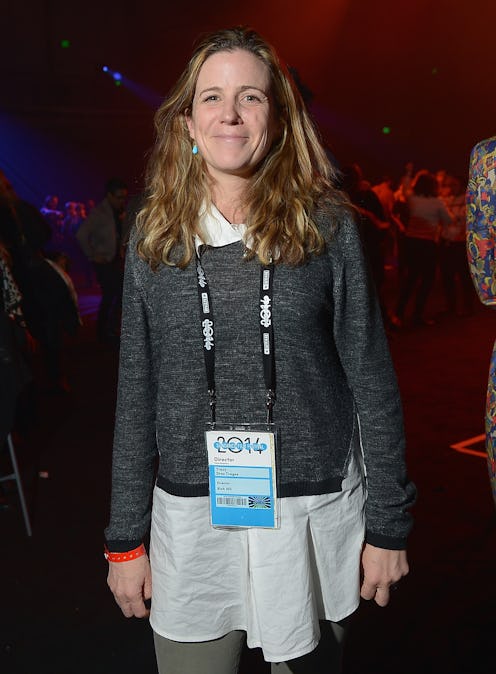Entertainment
This Abortion Documentary Is A Must-See
You could call filmmaker Tracy Droz Tragos the Robin Hood of feminism. Her latest film, the documentary Abortion: Stories Women Tell , steals the issue of abortion away from the talking heads and gives it back to the real women who experience it. "I want to change the climate of the discussion," Tragos tells Bustle. "Male politicians have hijacked the conversation and are elected on their platform. They get votes depending on whether or not they're talking about it."
With Stories, which premiered at the Tribeca Film Festival this past April and will be released on HBO in late 2016, Tragos is trying to spark that change by chronicling the lives of multiple women involved in the discourse and weaving together a dynamic, current image of abortion. In the documentary, Tragos follows 32 women involved in the conversation about abortion — providers, protesters, pro-choice folks, and even women who now regret having the procedure — and spins a complete image of what abortion looks like on an intimate, complicated level. It's a good reminder that issues of reproductive justice are political, yes, but also intensely personal.
"I wanted to how women feel and create an intimate place, where it's easier to have conversations with each other."
To keep things even more intimate, Tragos tells Bustle that she decided to shoot the film exclusively in her home of Missouri, a state where, as of 2011, 97% of counties don't have an abortion clinic, according to the Guttmacher Institute. Yet although Tragos herself has never had an abortion, she says that she has always felt supported in her right to choose. "I've had access to abortion and birth control my whole life," the director says. "My mom told me, 'The minute you even think about 'it,' let me know. Come to me. I'm not sure every mother is like that."
Tragos brought these experiences and her own pro-choice politics to the table when deciding to make an abortion-centric documentary, but ultimately wanted to produce a film that showed multiple angles on the topic. "We didn’t want this to be an advocacy piece," she explains. "I wanted to how women feel and create an intimate place, where it's easier to have conversations with each other."
Stories, Tragos hopes, will forge a connection between viewers who have different perspectives. "It's deeply important to recognize things we have in common, to start with common ground," she says. "When it came to interviewing pro-life subjects, I knew that I didn’t agree, so I had to practice extra-deep listening and not dismiss them."
"So many pro-life folks have had abortions. They feel a sense of isolation and shame, and I want to help with that stigma."
The wide scope of Tragos' camera enticed female executives at HBO Documentaries. who collaborated with the filmmaker throughout production. "This is what happens when women are involved in the film industry. Our intentions were aligned, and we were willing to take the same risks," says the director. "We all wanted to explore abortion and wanted to keep it balanced. We wanted to show the pro-life side of the story while reaching for our ultimate goal."
Tragos hopes that the movie will bolster feelings of empathy among viewers. She says that she personally went from having a black-and-white perspective on abortion, to something a bit more gray. "Women come from different circumstances, in different sizes and shapes," she says, "and so many pro-life folks have had abortions. They feel a sense of isolation and shame, and I want to help with that stigma. I know what it's like in Missouri, I remember that judgement."
Tragos says that negative attitudes towards women's sexualities create this stigma. "People always say, 'Well, you shouldn’t have been sex,' but that concept never works," she explains. "Birth control isn't readily available, and the culture tells women need to be quiet about their sexualities. It's hard to live in."
"It's more difficult to come to one conclusion when you have to look someone in the eye."
Stories, however, seems to have struck a chord across the political aisle. While HBO has yet to pinpoint a release date, Tragos recalls how Stories started some wonderful conversations at Tribeca. "One of the guys on our production team grew up praying outside clinics," Tragos says. "He's pro-choice now, but he brought parents to premiere." The mother, Tragos claims, said that she was very moved by the documentary and, despite her traditional Catholic beliefs, called Stories "beautiful." It's this type of compassion and connection that the director hopes to foster with the film. "When you see real women with complicated lives, real people, it makes it harder to dismiss," she says. "It's more difficult to come to one conclusion when you have to look someone in the eye."
With two young daughters, Tragos recognizes the importance of reproductive health care in the lives of women everywhere, no matter their views. Says the filmmaker, "Since I am pro-choice, it's very easy to say what I would do in that situation, but I’ve never been in that circumstance and can’t actually say I'd do one thing or another." Pro-choice or not, Tragos says, every woman should have access to care for her own body and chart her own life. "Without that agency," the director adds, "women truly are second-class citizens." With Stories We Tell, Tragos is shining a light on this issue, and providing a voice for women everywhere.
Images: HBO; Giphy
